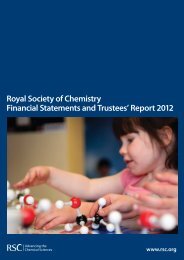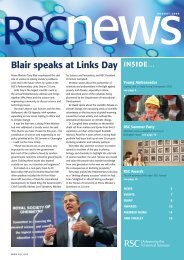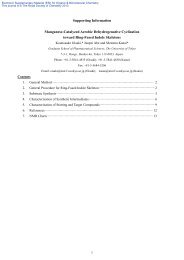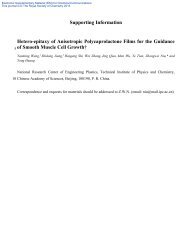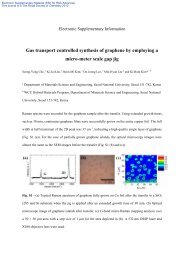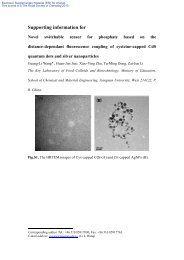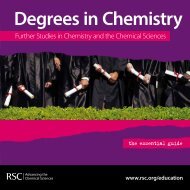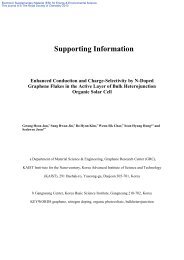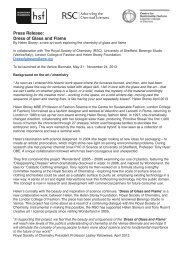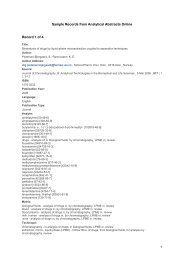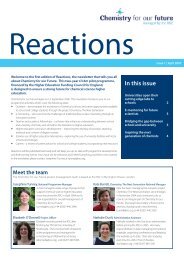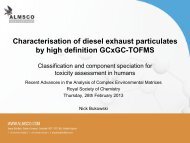January 2011 - Institute of Physics
January 2011 - Institute of Physics
January 2011 - Institute of Physics
You also want an ePaper? Increase the reach of your titles
YUMPU automatically turns print PDFs into web optimized ePapers that Google loves.
Macro Group UK & Polymer <strong>Physics</strong> Group Bulletin No 75 <strong>January</strong> <strong>2011</strong> Number Page 75 1<br />
MACRO GROUP UK<br />
POLYMER PHYSICS GROUP<br />
BULLETIN<br />
<strong>January</strong> <strong>2011</strong><br />
INSIDE THIS ISSUE:<br />
Editorial<br />
Views from the Top 2<br />
PPG & MGUK Committee members 3<br />
MacroGroup UK Awards 4<br />
PPG and MacroGroup News 6<br />
Forthcoming Meetings 8<br />
Bursaries 12<br />
Conference Reports 13<br />
MGUK committee Nominations 16<br />
Welcome to the <strong>January</strong> <strong>2011</strong> bulletin. This issue welcomes Steve Eichhorn from<br />
the University <strong>of</strong> Manchester as the PPG Bulletin Editor, replacing James<br />
Sharp. We thank James for his hard work over the past years to co-edit the<br />
bulletin.<br />
As well as the usual content announcing and reporting from recent conferences,<br />
we are delighted to be able to announce the award <strong>of</strong> the PPG Founders Prize to<br />
Pr<strong>of</strong>. Tom McCleish (University <strong>of</strong> Durham) as well as the MGUK Medal to<br />
Pr<strong>of</strong>. Ian Manners (University <strong>of</strong> Bristol) and the joint award <strong>of</strong> the MGUK<br />
Young Researchers Medal to Dr Jon Weaver (Imperial College London) and Dr<br />
Oren Scherman (University <strong>of</strong> Cambridge).<br />
This issue also contains news from the polymer degradation discussion group<br />
(PDDG) and the Biological <strong>Physics</strong> Group. Finally we draw you attention to an<br />
excellent article detailing the application <strong>of</strong> polymers in home and personal care<br />
products.<br />
We hope that you enjoy reading this issue <strong>of</strong> the bulletin. As ever, if you would<br />
like to contribute any articles please get in contact with either <strong>of</strong> us.<br />
Contributions for inclusion in the BULLETIN<br />
should be emailed (preferably) or sent to<br />
either:<br />
Dr Andrew Dove (MG UK),<br />
Department <strong>of</strong> Chemistry<br />
University <strong>of</strong> Warwick,<br />
Coventry, CV4 7AL<br />
Andrew Dove<br />
Steve Eichhorn<br />
Bulletin Officers<br />
a.p.dove@warwick.ac.uk<br />
Tel: (024) 7652 4107<br />
Or<br />
Dr Stephen Eichhorn (PPG)<br />
School <strong>of</strong> Materials<br />
University <strong>of</strong> Manchester<br />
Grosvenor Street<br />
Manchester, M1 7HS<br />
s.j.eichhorn@manchester.ac.uk<br />
The Pure and Applied Macromolecular Chemistry Group<br />
(Macro Group UK) is a joint group <strong>of</strong> the Royal Society <strong>of</strong> Chemistry and the Society<br />
<strong>of</strong> Chemical Industry.<br />
The Polymer <strong>Physics</strong> Group is a joint group <strong>of</strong> the <strong>Institute</strong> <strong>of</strong> <strong>Physics</strong> and the<br />
Royal Society <strong>of</strong> Chemistry.<br />
Tel: (0161) 306 3586<br />
The deadline for contributions for the next<br />
issue is<br />
30 June <strong>2011</strong>.
Macro Group UK & Polymer <strong>Physics</strong> Group Bulletin No 75 <strong>January</strong> <strong>2011</strong> Page 2<br />
Views from the Top<br />
From the Chairman <strong>of</strong><br />
Macro Group<br />
Thoughts from the<br />
PPG Chair<br />
At the time <strong>of</strong> writing, it is a balmy 13 o C in Nottingham and I was<br />
just thinking that I am sure there are a very large number <strong>of</strong> polymer<br />
products for which I should be very grateful for getting us<br />
through the cold period we have just all endured; from the vast<br />
range <strong>of</strong> different polymeric layers in our ski clothing, to the pour<br />
point depressants that kept my car moving when we reached -<br />
18 o C. As polymer scientists, we do have a duty to emphasise to<br />
the general public that polymers are everywhere and are extremely<br />
useful, but perhaps we also need to do a little bit more.<br />
Certainly, MACRO Group over the last few years has been developing<br />
a significant body <strong>of</strong> very useful educational and fun materials.<br />
These have been prepared under a project known as the<br />
“polymer road show” and we are now working hard to see if they<br />
can be finished and distributed to every secondary school in the<br />
UK – watch this space!<br />
The most recent MACRO Group committee meeting took place in<br />
early December and almost became a victim <strong>of</strong> the cold weather<br />
– a couple <strong>of</strong> our members were snow bound and the first two<br />
meeting rooms that we tried to use in the School <strong>of</strong> Chemistry at<br />
Nottingham were badly flooded because <strong>of</strong> the effects <strong>of</strong> frozen<br />
pipes. We discovered on the day that similar problems had been<br />
encountered around the country and we heard particularly <strong>of</strong><br />
burst pipes in both Glasgow and Warwick. Clearly, better thermal<br />
lagging still needs to be developed in the UK. However, the<br />
meeting was a success and what was most pleasing was that<br />
from two very competitive lists <strong>of</strong> nominations, we were able to<br />
award the MACRO Group UK Medal for 2010 to Pr<strong>of</strong>essor Ian<br />
Manners <strong>of</strong> Bristol University and the MACRO Group Young Researchers<br />
Medal for 2010 was awarded jointly to Dr Oren Scherman<br />
(Cambridge) and Dr Jon Weaver (Imperial College). Congratulations<br />
to all three recipients. A One Day Symposium celebrating<br />
these medal awards is likely to occur during the month <strong>of</strong><br />
June and full details will be advertised shortly.<br />
On the subject <strong>of</strong> younger researchers, I am also delighted to announce<br />
that the <strong>2011</strong> MACRO Group Young Researchers Meeting<br />
(YRM) will be held in Liverpool (July 11 TH /12 th ). This is a<br />
hugely important event for UK polymer science and is one that is<br />
well sponsored so that we can heavily subsidise and discount the<br />
attendance <strong>of</strong> our younger MACRO Group members – that’s a<br />
hint for you to join if you have not done so already!!<br />
The event is particularly targeted at PhD students and PDRAs<br />
across polymer science in the UK and as another attraction, all<br />
participants could win one <strong>of</strong> the annual Domino/MACRO Group<br />
YRM Awards which come with quite a significant cash prize. Further<br />
details can be found within this bulletin and on the MACRO<br />
Group website (http://www.macrogroup.org.uk).<br />
I hope you enjoy reading this bulletin<br />
With all best wishes<br />
Steve Howdle<br />
Chairman<br />
Macro Group<br />
On researching and teaching polymer physics<br />
Those <strong>of</strong> us who work in British universities certainly can’t<br />
complain that their lives are short <strong>of</strong> incident at the moment.<br />
We are about to see a momentous shift in the way<br />
teaching at universities is funded, with the bulk <strong>of</strong> government<br />
support being withdrawn and replaced by a substantially<br />
increased contribution from the students themselves.<br />
Many <strong>of</strong> the details remain to be worked out, and we can<br />
only speculate as to how the consequences <strong>of</strong> this may<br />
play out. So universities find themselves the objects <strong>of</strong> a<br />
somewhat poorly controlled experiment, whose outcome<br />
remains highly uncertain. What, though, will the impact <strong>of</strong><br />
these changes be on our research?<br />
The obvious answer is simply that, for those <strong>of</strong> us who<br />
work in University science and engineering departments,<br />
the finances <strong>of</strong> those departments are intimately tied up<br />
with the students they teach. If big shifts in student demand<br />
do take place, the effect <strong>of</strong> that may be to put in<br />
question the long-term viability <strong>of</strong> those departments. We<br />
have had many assurances from Government that they<br />
understand the importance <strong>of</strong> science and engineering,<br />
but it is difficult to be confident that there won’t be some<br />
unanticipated consequences from changes <strong>of</strong> this magnitude.<br />
At a deeper level, we’re seeing a questioning <strong>of</strong> some <strong>of</strong><br />
the fundamental assumptions about higher education that<br />
we’ve grown used to – in particular, the assumption that<br />
research and teaching must necessarily go together. With<br />
a focus on value for money from much increased tuition<br />
fees, we can expect more suggestions that university research<br />
is an indulgence, a distraction from academics’<br />
proper jobs, doing lectures, labs and tutorials for their students.<br />
I believe that teaching in the most advanced areas<br />
<strong>of</strong> science and technology is immeasurably better when<br />
done by researchers who are contributing to those advances.<br />
But this is an argument that can’t be taken for<br />
granted.<br />
Are we involving undergraduate students in the work going<br />
on in our research groups, through projects? Do we have<br />
advanced modules in our courses describing the most<br />
exciting new developments in polymer and s<strong>of</strong>t matter<br />
physics? Do we illustrate and enliven our teaching <strong>of</strong> basic<br />
science and engineering courses by reference to our own<br />
first-hand research experience? These are the sorts <strong>of</strong><br />
questions we need to ask ourselves in the times ahead, if<br />
we are to be convincing about the importance <strong>of</strong> the links<br />
between teaching and research.<br />
With all best wishes<br />
Richard Jones<br />
Chairman<br />
Polymer <strong>Physics</strong> Group
Macro Group UK & Polymer <strong>Physics</strong> Group Bulletin No 75 <strong>January</strong> <strong>2011</strong> Page 3<br />
PPG & Macro Group Committees<br />
Polymer <strong>Physics</strong> Group Committee<br />
Macro Group Committee<br />
Chair:<br />
Pr<strong>of</strong>essor Richard Jones<br />
Vice-Chair:<br />
Dr. Simon Hanna<br />
Honorary Secretary and Treasurer:<br />
Dr. Nigel Clarke<br />
Ordinary members:<br />
Dr. Michael Butler<br />
Dr. Mike Jenkins<br />
Dr. Sally Organ<br />
Dr. João Cabral<br />
Dr. Aline Miller<br />
Dr. James Sharp (Bulletin Officer)<br />
Dr. Daniel Read<br />
Dr. Ali Zarbakhsh (Co-Opted)<br />
Chairman: Pr<strong>of</strong>. Steve Howdle (University <strong>of</strong> Nottingham) 2010 - 2013<br />
Secretary: Dr Rachel O’Reilly (University <strong>of</strong> Warwick) 2010 - 2013<br />
Treasurer: Dr Sharon Cooper (University <strong>of</strong> Duhram) 2008 - <strong>2011</strong><br />
Ordinary Members:<br />
Dr Carl Waterson (Innospecinc), Meetings Programme Officer 2006 - 2012<br />
Dr Raj Bhardwaj (Polymer Laboratories) 2007 - 2013<br />
Dr Andrew Dove (University <strong>of</strong> Warwick), Bulletin Officer 2007 - 2013<br />
Dr Christopher Sammon (Sheffield Hallam University), Web Site Officer 2007 - 2013<br />
Pr<strong>of</strong>. Ian Manners (University <strong>of</strong> Bristol) 2008 - <strong>2011</strong><br />
Dr Ezat Koshdel (Unilever) 2008 - <strong>2011</strong><br />
Pr<strong>of</strong>. Ian Hamley (University <strong>of</strong> Reading) EPF Representative 2008 - <strong>2011</strong><br />
Dr Jon Weaver (University <strong>of</strong> Liverpool) 2009 - 2012<br />
Pr<strong>of</strong>. Peter Budd (University <strong>of</strong> Manchester) 2009 - 2012<br />
Pr<strong>of</strong>. Rein Ulijn (University <strong>of</strong> Strathclyde) Membership Officer 2009 - 2012<br />
Dr David Price (Lubrizol) 2009 - 2012<br />
Dr Oren Scherman (University <strong>of</strong> Cambridge) 2010 - 2013<br />
Dr Dave Adams (University <strong>of</strong> Liverpool) 2010 - 2013<br />
Dr Andrew Naylor (Critical Pharmaceuticals Ltd.) Web Site Officer 2010 - 2013<br />
Dr Peter Shaw (Synthomer) 2010 - 2013<br />
Co-opted Member:<br />
Dr Fred Davies (University <strong>of</strong> Reading), Polymer Roadshow Officer<br />
Representative Members:<br />
Representing Society <strong>of</strong> Chemical Industry:<br />
Dr Jon Weaver (Imperial College London)<br />
Representing Colloid & Interface Science Groups, RSC and SCI:<br />
Pr<strong>of</strong>. Peter Williams (NEWI)<br />
Representing Materials Chemistry Forum, RSC:<br />
Pr<strong>of</strong>. Stephen Yeates (University <strong>of</strong> Manchester)<br />
Representing Polymer <strong>Physics</strong> Group, IoP:<br />
Dr James Sharp (University <strong>of</strong> Nottingham)<br />
Representing Biomaterials Chemistry Group, RSC:<br />
Dr Aline Miller (University <strong>of</strong> Manchester)<br />
Representing <strong>Institute</strong> <strong>of</strong> Materials, Minerals and Mining:<br />
Dr John Gearing (Gearing Scientific Ltd.)<br />
Representing Polymer Degradation Discussion Group:<br />
Dr Mogon Patel (AWE)<br />
Representing Polymer Colloids Forum:<br />
Pr<strong>of</strong>. Peter Lovell (University <strong>of</strong> Manchester)<br />
Representing RAPS Network:<br />
Dr Steve Edmundson (University <strong>of</strong> Loughborough)<br />
Career Break Grants<br />
The <strong>Institute</strong>’s Career Break Grants help members to stay in touch with the wider physics community.<br />
Contributions towards attendance and associated costs are available.<br />
Members can apply by going to http://www.iop.org/activity/academia/Career_Break_Grants/page_5466.html<br />
or by emailing cbg@iop.org<br />
Career Break Rates for Conferences<br />
Members can attend all <strong>Institute</strong> <strong>of</strong> <strong>Physics</strong> conferences at a reduced rate.<br />
Reduced Membership Subscription Rates<br />
Members on a career break are entitled to a reduced membership subscription rate, which is currently just £10.<br />
Email membership.iop.org, including your membership ID number in the text, to qualify for this rate.
Macro Group UK & Polymer <strong>Physics</strong> Group Bulletin No 75 <strong>January</strong> <strong>2011</strong> Page 4<br />
MacroGroup UK/Polymer <strong>Physics</strong> Group Awards<br />
MACRO Group Medal Awards Announced<br />
Macro Group UK Medal<br />
Polymer <strong>Physics</strong> Group Founders’ Prize<br />
The Polymer <strong>Physics</strong> Group Founders' Prize was instigated to commemorate the work <strong>of</strong><br />
Pr<strong>of</strong>essor Andrew Keller. It is awarded biennially to a scientist who has made an outstanding<br />
contribution to Polymer <strong>Physics</strong> in the UK or Ireland. The next prize will be awarded at the<br />
<strong>2011</strong> biennial conference (see Forthcoming Meetings & Conferences, pg. 8).<br />
The Founders’ prize this year is awarded to Pr<strong>of</strong>. Tom McLeish (University <strong>of</strong> Durham), an<br />
immensely talented theoretical physicist whose career has been marked by the way he’s<br />
worked with experimentalists to apply the most sophisticated theory to real industrial problems.<br />
Tom began his research career with a PhD from the Cavendish Laboratory in Cambridge,<br />
where he worked on molecular theories <strong>of</strong> rheology. After a period at the University <strong>of</strong> Sheffield,<br />
he took up a chair at the University <strong>of</strong> Leeds. Here he developed theories <strong>of</strong> the flow <strong>of</strong><br />
non-linear polymers, and has led a large, UK-wide team <strong>of</strong> experimentalists and theorists to<br />
create experimentally verified molecular models <strong>of</strong> polymer flow and develop them to the<br />
stage where they are applicable to industrial situations. Interdisciplinarity has also characterised<br />
his work on biological physics, developing theoretical frameworks to peptide aggrega-<br />
Pr<strong>of</strong>. Tom McLeish<br />
tion and new approaches to protein dynamics. In addition to his research achievements, he<br />
has been an articulate and charismatic spokesman for polymer and s<strong>of</strong>t matter physics in particular, and science in<br />
general. He continues to champion interactions between all disciplines in his current role as Pro-Vice-Chancellor for<br />
Research at the University <strong>of</strong> Durham..<br />
The Macro Group UK Medal is awarded annually to a UK-based scientist who has made a significant and substantial<br />
contribution to the development <strong>of</strong> polymer science through his/her scientific achievements and/or services<br />
to the UK polymer science community.<br />
This years award has been made to Pr<strong>of</strong>. Ian Manners (University <strong>of</strong> Bristol) for his outstanding contribution to the<br />
UK polymers. Pr<strong>of</strong>. Manners has made a key contribution to the field <strong>of</strong> metallo-polymers,<br />
being most well known for the synthesis and application <strong>of</strong> poly(ferrocenyl-silane)s and<br />
other related polymers. Amongst Pr<strong>of</strong>. Manners most recent work is the development <strong>of</strong><br />
‘living’ supramolecular crystallization-driven self-assembly. Utilizing the highly crystalline<br />
nature <strong>of</strong> poly(ferrocenyl silane)s in block copolymers, solvent selective micellization has<br />
been shown to selectively produce cylindrical structures. The process has been perfected<br />
such that cylinders <strong>of</strong> highly controlled lengths can now be realized and a range <strong>of</strong> multifunctional,<br />
including multi-block cylindrical micelles can now be realized. This work has led<br />
to publication in several <strong>of</strong> the highest impacting scientific journals. Further work has focussed<br />
on the application <strong>of</strong> poly(ferrocenyl silane)s in combination with colloidal silica particles<br />
to realize a photonic material that can tuned to any colour. Termed P-Ink (photonic ink) this<br />
work was developed in collaboration with Pr<strong>of</strong>. Ge<strong>of</strong>f Ozin and led to publication in Nature<br />
Photonics as well as the founding <strong>of</strong> a company, namely Opalux.<br />
Despite beginning his academic career in Canada, Pr<strong>of</strong>. Manners has always maintained<br />
Pr<strong>of</strong>. Ian A. Manners excellent contact with the UK academic community. Indeed he has been presented with<br />
awards such as the RSC Corday-Morgan Medal in 1997. Since his return to the UK, assisted<br />
by an EU Marie Curie Chair in 2005, Pr<strong>of</strong>. Manners has continued to be recognized for his achievements including<br />
Royal Society Wolfson Merit Award (2005), Royal Society <strong>of</strong> Chemistry Award in Main Group Chemistry<br />
(2005) and the Tilden Lectureship, Royal Society <strong>of</strong> Chemistry (2007). Pr<strong>of</strong>. Manners has served on several journal<br />
editorial advisory boards including Angewandte Chemie International Edition, Journal <strong>of</strong> Inorganic and Organometallic<br />
Polymers and Advances in Polymer Science as well as recently completed service on the editorial advisory<br />
boards <strong>of</strong> Macromolecules, Macromolecular Chemistry and <strong>Physics</strong> and Macromolecular Rapid Communications.<br />
Since 2006 Pr<strong>of</strong> Manners has also been an Associate Editor for the Journal <strong>of</strong> Organometallic Chemistry.<br />
Continued over the page......
Macro Group UK & Polymer <strong>Physics</strong> Group Bulletin No 75 <strong>January</strong> <strong>2011</strong> Page 5<br />
MacroGroup UK Awards/Polymer <strong>Physics</strong> Group Awards<br />
Macro Group UK Young Researchers Medal<br />
The Macro Group UK Young Researchers Medal is awarded annually<br />
to a UK-based scientist, normally under the age <strong>of</strong> 36 on December<br />
31st <strong>of</strong> the preceding year, whose contributions to polymer<br />
science show outstanding promise for the future. This years<br />
award has been made jointly to Dr Jon Weaver (Imperial College,<br />
London) and Dr Oren Scherman (University <strong>of</strong> Cambridge).<br />
Macro Group UK Medal for Outstanding<br />
Achievement *<br />
Dr Jon Weaver<br />
Jon’s research activities span various<br />
aspects <strong>of</strong> synthetic polymer chemistry,<br />
polymer self-assembly mechanisms,<br />
(polymer) nanoparticle synthesis, colloidal<br />
chemistry, responsive materials and<br />
functional polymer-stabilised emulsions<br />
(see dedicated research pages for more<br />
details). An overarching aim is to understand<br />
the fundamental design rules and<br />
mechanisms operating in these systems<br />
to the point that it is possible retrodesign<br />
high-level complexity and advanced<br />
function using simplified, generic<br />
and viable processes<br />
2010 C. J. Hawker<br />
2008 M. Antoinetti<br />
2006 J.M.J. Fréchet<br />
2005 K. Matyjaszewski<br />
2004 P. Hodge<br />
2003 A.B. Holmes<br />
2002 D.C. Sherrington<br />
2001 J.M.G. Cowie<br />
2000 J.C. Bevington<br />
1999 E.W. Meijer<br />
1998 W.J. Feast<br />
1997 G. Wegner<br />
Dr Oren Scherman<br />
Oren’s research interests include the<br />
synthesis <strong>of</strong> functional nanosystems,<br />
controlled polymer architectures and dynamic<br />
supramolecular assemblies<br />
through molecular recognition processes.<br />
The underlying theme <strong>of</strong> his research<br />
lies at the interface between synthetic<br />
organic efforts on small molecules<br />
and macroscopic properties at the materials<br />
level, developing a macro-organic<br />
approach to chemistry. Dynamic supramolecular<br />
self-assembly <strong>of</strong> materials<br />
will be an area <strong>of</strong> great importance in the<br />
coming years, allowing for innovations<br />
in nanotechnology and at the biological<br />
and chemical interfaces.<br />
The 2010 Macro group medals will be<br />
awarded at a special 1 day symposium<br />
at the RSC Burlington House<br />
on the 28th June, contact Rachel<br />
O'Reilly (r.k.o-reilly@warwick.ac.uk)<br />
for further details.<br />
Macro Group UK Medal<br />
2010 I. A. Manners<br />
2009 A. J. Ryan<br />
2008 S.M. Howdle<br />
2007 S.P. Armes<br />
2006 D.M Haddleton<br />
Macro Group UK Young<br />
Researchers Medal<br />
2010 J.V.M. Weaver<br />
O.A. Scherman<br />
2009 A. P. Dove<br />
2008 A.F. Miller<br />
R.K O’Reilly<br />
2007 R.V. Ulijn<br />
2006 S. Pérrier<br />
2005 P.A.G. Cormack<br />
2004 W.C. Hayes<br />
2003 N.R. Cameron<br />
2002 A.I. Cooper<br />
2001 W. Huck<br />
1999 A. Slark<br />
1997 S. Rannard<br />
* previously known as the Macro Group UK Lectureship<br />
and Medal (1997-2005)
Macro Group UK & Polymer <strong>Physics</strong> Group Bulletin No 75 <strong>January</strong> <strong>2011</strong> Page 6<br />
The multibillion dollar Home and Personal Care (HPC)<br />
market exceeded $65 billion in 2009! Broadly this covers<br />
market sectors which include laundry, hair, skin and oral<br />
care, deodorants, kitchen and bathroom care products<br />
and machine dish washing. There are many familiar<br />
products in these categories which include laundry detergents,<br />
shampoos and conditioners, hair fixatives, gels,<br />
creams, mousses nail polishes, deodorant sticks and<br />
tooth paste, to name a few.<br />
Polymers represent the second largest class <strong>of</strong> ingredients<br />
in most <strong>of</strong> these products and generally play a<br />
very important role. Indeed, polymers play such a key<br />
role that most <strong>of</strong> these modern products will not function<br />
without them.<br />
Originally naturally occurring polymers were exploited<br />
but nowadays a diverse range <strong>of</strong> both synthetic and<br />
naturally derived polymers are employed that perform<br />
various important functions. For example, they are used<br />
as film-formers in hair fixatives, mascara, nail enamels,<br />
skin-sensory, and transfer-resistant colour cosmetics; as<br />
thickeners and rheology modifiers in emulsions, gels,<br />
hair colorants and hair relaxers; as emulsifiers in lotions,<br />
sunscreens and hair colourants and as conditioners,<br />
moisturisers, emollients, dispersants and water-pro<strong>of</strong>ers.<br />
Examples <strong>of</strong> functional polymers employed in Home<br />
and Personal Care products include certain polymeric<br />
poly(carboxylates), such as poly(acrylates) and soil release<br />
polymers such as hydrophilic poly<br />
(ethyleneterephthalates) to provide enhanced detergency;<br />
anti-dye transfer polymers such as poly<br />
(vinylpyrrolidone) or poly(vinyl imidazole) in colour<br />
brands to inhibit the transfer <strong>of</strong> fugitive dyes from one<br />
fabric to another during laundering (hence avoiding pink<br />
T-shirt syndrome) and polymeric encapsulates for delivery<br />
<strong>of</strong> long lasting perfume.<br />
In the hair care area cationically modified guar gum, a<br />
polysaccharide composed <strong>of</strong> both galactose and mannose,<br />
is used in certain shampoo formulations as silicone<br />
deposition aid to provide enhanced conditioning benefits;<br />
hydrophilic poly(acrylates) or poly(urethanes) are used in<br />
hair sprays, mousses and gels for styling applications<br />
and lightly crosslinked, hyperbranched poly(acrylates)<br />
such as Carbopol (a hyperbranched poly(acrylic acid))<br />
are employed as structuring agents in various hair gels.<br />
PPG and MacroGroup News<br />
The Importance <strong>of</strong> Polymers in Home and<br />
Personal Care Products<br />
In recent years more sophisticated polymers, for example,<br />
graft and block copolymers made by living radical polymerisation,<br />
hyperbranched polymers and dendrimers,<br />
Shell Crosslinked Knedels (SCK) and Janus particles<br />
have been examined by the industry in order to help develop<br />
advanced new products with desirable properties<br />
unattainable by other means. A key challenge here is how<br />
to scale up such complex polymers from gram or kilogram<br />
scale to multi-thousand ton scales at an affordable price.<br />
In addition the advent <strong>of</strong> REACH (1) in Europe, tougher<br />
global environmental regulations, new legislations and<br />
drive to move to more sustainable materials/processes<br />
pose huge challenges for polymer scientists and engineers<br />
alike. A potentially useful start would require novel<br />
polymer designs derived from sustainable routes obtained<br />
from natural sources and preferably from waste products,<br />
the use <strong>of</strong> efficient catalysts, biocatalysts and enzymatic<br />
routes, environmentally friendly medium, e.g. using supercritical<br />
carbon dioxide or water as solvent, using energy<br />
efficient processes and routes, etc, in other words applying<br />
the twelve principles <strong>of</strong> “Green Chemistry”.<br />
In the 21 st century, the outlook and the future <strong>of</strong> polymer<br />
science are exceedingly bright for young polymer scientists<br />
with strong ambitions to tackle these challenges by<br />
focusing on using resources in a sustainable manner and<br />
helping to save the environment and the planet. This large<br />
and important industry is seeking to utilise all new polymerisation<br />
methodology, is seeking to replace oil derived<br />
chemicals with renewable feedstocks and optimise existing<br />
processes. There is a genuine move towards an increasing<br />
use <strong>of</strong> polymers and as such increasing job opportunities<br />
for well trained polymer scientists in both synthetic<br />
methods and characterization and modelling.<br />
Registration, Evaluation, Authorisation and Restriction<br />
<strong>of</strong> Chemicals (REACH) is a European Union Regulation<br />
<strong>of</strong> 18 December 2006 which addresses the production<br />
and use <strong>of</strong> chemical substances, and their potential<br />
impacts on both human health and the environment . An<br />
article dedicated to REACH will follow in the next issue.<br />
Ezat Khosdel, Unilever R&D, Port Sunlight
Macro Group UK & Polymer <strong>Physics</strong> Group Bulletin No 75 <strong>January</strong> <strong>2011</strong> Page 7<br />
PPG and MacroGroup News<br />
POLYMER DEGRADATION DISCUSSION<br />
GROUP, PDDG<br />
(A sub-group <strong>of</strong> Macro Group UK)<br />
The PDDG is a Sub-Group <strong>of</strong> the UK Royal Society <strong>of</strong><br />
Chemistry-Macro Group with the key function to provide an<br />
opportunity for researchers and scientists with similar interests<br />
to meet, and discuss the subject area, including latest<br />
advances on all aspects <strong>of</strong> degradation, ageing, stabilisation<br />
and modification <strong>of</strong> polymers, and to give early career<br />
researchers the opportunity to discuss/present, in many<br />
cases for the first time, their work to a mixed audience <strong>of</strong><br />
young researchers and experts in the field.<br />
This subject area has acquired increased importance in<br />
the current economic climate where many polymeric materials/components<br />
are expected to be multifunctional (smart)<br />
and require extended useful life. The group has also noted<br />
a general erosion <strong>of</strong> UK capability, expertise and interest<br />
within this subject area over the last decade or so. An important<br />
objective <strong>of</strong> the group is to communicate the importance<br />
<strong>of</strong> retaining and possibly re-acquiring UK capability/<br />
expertise.<br />
A key activity <strong>of</strong> the group is to organise Biennial Polymer<br />
Degradation Discussion Group Conferences, giving researchers<br />
a forum for scientific and technical discussions,<br />
including the opportunity <strong>of</strong> strengthening links (networking)<br />
with academia and industry.<br />
Traditionally, the group has held its meetings within the<br />
UK, however due to increased current research activities<br />
within Europe, our last meeting was organised in Italy and<br />
proved to be highly successful. Our next meeting is the 29 th<br />
Biennial Polymer Degradation Discussion Group Conference,<br />
September 5-7, <strong>2011</strong>, Sestri Levante, Italy (see picture<br />
below)<br />
Biological physics group<br />
Dr. Matthew Harvey and Dr. Tom Waigh <strong>of</strong> the Biological<br />
<strong>Physics</strong> group based at the Photon Science <strong>Institute</strong> have<br />
built a new device that allows the velocity pr<strong>of</strong>iles <strong>of</strong><br />
opaque materials to be measured as they are sheared.<br />
They have used it to study a range <strong>of</strong> s<strong>of</strong>t matter systems<br />
under flow including colloids (polystyrene spheres in water),<br />
polyelectrolytes, margarine and plant cell suspensions<br />
(tomato ketchup). Unusual fluid mechanics/viscoelastic<br />
phenomena have been measured such as wall slip and<br />
shear banding. The apparatus uses optical fibres. It is built<br />
around a Michelson interferometer and functions at infra<br />
red wavelengths<br />
Figure. Two dimensional velocity pr<strong>of</strong>ile <strong>of</strong> colloidal spheres<br />
measured across the gap <strong>of</strong> a plate-plate rheometer<br />
sheared at a constant rate.<br />
Velocity (mm/s)<br />
30<br />
25<br />
20<br />
15<br />
10<br />
5<br />
0<br />
Gap size 600 µm<br />
-200 0 200 400 600<br />
Distance (µm)<br />
Hotel vis-à-vis, the venue for the 29 th PDDG meeting,<br />
Sep 5-7, <strong>2011</strong><br />
The activities <strong>of</strong> the group also generate the added benefit<br />
<strong>of</strong> increasing the international reputation and recognition<br />
<strong>of</strong> not only the PDDG, but also that <strong>of</strong> the RSC and the<br />
Macro Group UK. Further details <strong>of</strong> the activities <strong>of</strong> the<br />
group can be found at the PDDG website at www.PDDG.org.<br />
Mogon Patel, AWE<br />
Velocity (mm/s)<br />
4.0<br />
3.5<br />
Gap size 150 µm<br />
3.0<br />
2.5<br />
2.0<br />
1.5<br />
1.0<br />
0.5<br />
Slip length<br />
0.0<br />
-0.5<br />
-50 0 50 100 150 200<br />
Distance (µm)<br />
Figure. Velocity pr<strong>of</strong>iles across a plate-plate rheometer as a<br />
function <strong>of</strong> gap separation. a) Shear banding with polyacrylamide<br />
solutions, b) wall slip with margarine.<br />
Reference: M.Harvey, T.A.Waigh, ‘Optical coherence tomography<br />
velocimetry in controlled shear flow’, Physical Review E, <strong>2011</strong>, to<br />
appear.
Macro Group UK & Polymer <strong>Physics</strong> Group Bulletin No 75 <strong>January</strong> <strong>2011</strong> Page 8<br />
Forthcoming Meetings & Conferences<br />
Plans Announced for “Milestone” Biennial Meeting <strong>of</strong> the Polymer <strong>Physics</strong> Group<br />
The next biennial meeting <strong>of</strong> the Polymer <strong>Physics</strong> Group (PPG) will be an historic milestone, because it will<br />
mark the 25 th time the Group has met. Entitled “Physical Aspects <strong>of</strong> Polymer Science,” it will be held from<br />
September 12 th to 14 th , <strong>2011</strong> at the University <strong>of</strong> Surrey in Guildford.<br />
A highlight <strong>of</strong> the meeting will be a lecture by the winner <strong>of</strong> the PPG Founders’ Prize, Pr<strong>of</strong>essor Tom<br />
McLeish (University <strong>of</strong> Durham). Complementing the programme <strong>of</strong> contributed lectures, there will be<br />
presentations from four invited speakers:<br />
• Pr<strong>of</strong>. Bill Koros, Georgia <strong>Institute</strong> <strong>of</strong> Technology (USA)<br />
• Pr<strong>of</strong>. Dieter Richter, IFF- Jülich (Germany)<br />
• Pr<strong>of</strong>. Olli Ikkala, Helsinki University <strong>of</strong> Technology (Finland)<br />
• Dr. Cait MacPhee, University <strong>of</strong> Edinburgh (UK)<br />
The research <strong>of</strong> these speakers represents a wide range <strong>of</strong> topics within polymer physics, spanning<br />
from polymer structure and dynamics to molecular transport to biological physics. Diversity is ensured.<br />
The American Physical Society (APS) Division <strong>of</strong> Polymer <strong>Physics</strong> (DPOLY) has awarded an exchange lectureship<br />
to Dr Bradley Olsen <strong>of</strong> the Massachusetts <strong>Institute</strong> <strong>of</strong> Technology (MIT), and so he will be contributing<br />
to the programme.<br />
To mark the occasion <strong>of</strong> the 25 th meeting, there will be a special conference dinner at Wotton House,<br />
near Dorking in Surrey. This venue will provide an excellent background for discussions along with a<br />
chance to get some fresh air. Wotton House was owned by the Evelyn family from 1579. In 1640, George<br />
Evelyn created an Italian garden around the house to the designs <strong>of</strong> his brother John Evelyn, the eminent<br />
garden designer, writer and diarist. John Evelyn was one <strong>of</strong> the forerunners <strong>of</strong> the English Landscape Garden<br />
Movement and it is for this reason that the gardens at Wotton are considered to be so significant.<br />
Wotton House, which is Grade II listed, was re-opened fully restored as a hotel and conference centre in<br />
September 2003.<br />
Student presentations, both oral and poster, will make an important and valued contribution to the<br />
meeting. A prize will be presented at the meeting for the best student publication, and the prize winner<br />
will present a lecture. See the separate story in this Newsletter about this competition.<br />
The fees for the meeting will be kept low because <strong>of</strong> the generous sponsorship from three sponsors<br />
(agreed to date):<br />
• Gearing Scientific<br />
• NT-MDT<br />
• Stable MicroSystems<br />
To submit an abstract and register for the meeting, go to the website at:<br />
www.paps10.iopconfs.org The deadline for abstract submission - for either poster or oral presentations -<br />
is Friday, May 6. Contact the local organiser, Pr<strong>of</strong>. Joe Keddie (j.keddie@surrey.ac.uk), with any questions.<br />
The venue for the conference dinner <strong>of</strong> the 25 th Biennial Meeting will be Wotton House.
Macro Group UK & Polymer <strong>Physics</strong> Group Bulletin No 75 <strong>January</strong> <strong>2011</strong> Page 9<br />
Forthcoming Meetings & Conferences<br />
Condensed Matter and Materials <strong>Physics</strong> (CMMP) 2010. 14 th -16 th December, 2010.<br />
This year’s CMMP will have a s<strong>of</strong>t matter/biological physics theme including two Biological <strong>Physics</strong> symposia:<br />
Biological <strong>Physics</strong> at the cellular scale.<br />
Invited Speakers Pr<strong>of</strong> Ray Goldstein, University <strong>of</strong> Cambridge<br />
Pr<strong>of</strong> Ramin Golestanian, University <strong>of</strong> Oxford.<br />
Biological <strong>Physics</strong> at the nanoscale<br />
Invited Speakers Pr<strong>of</strong> Suzi Jarvis, University College Dublin<br />
Dr Mark Leake, University <strong>of</strong> Oxford.<br />
Also this year there are two Plenary Lectures that are relevant to Biological <strong>Physics</strong>:<br />
Pr<strong>of</strong> Athene Donald, University <strong>of</strong> Cambridge, “Mott Lecture - Self Assembly <strong>of</strong><br />
Proteins”.<br />
Pr<strong>of</strong> Marshall Stoneham, UCL, “Where quantum physics meets biology”.<br />
For more details contact Jamie Hobbs (Jamie.hobbs@sheffield.ac.uk) or go to http://www.cmmp.org.uk/.
Macro Group UK & Polymer <strong>Physics</strong> Group Bulletin No 75 <strong>January</strong> <strong>2011</strong> Page 10<br />
Forthcoming Meetings & Conferences
Macro Group UK & Polymer <strong>Physics</strong> Group Bulletin No 75 <strong>January</strong> <strong>2011</strong> Page 11<br />
Forthcoming Meetings & Conferences<br />
Date(s) Title and Location Organiser<br />
26/06/11 - 01/07/11<br />
28/06/11<br />
04/07/11 - 07/07/11<br />
10/07/11 - 15/07/11<br />
10/07/11 - 14/07/11<br />
European Polymer Congress, Granada, Spain<br />
(www.epf<strong>2011</strong>.org)<br />
Macro Group UK Medal Meeting (Frontiers <strong>of</strong> Research), RSC,<br />
Burlington House, London<br />
10th International Conference on Materials Chemistry (MC10),<br />
Manchester, UK (www.rsc.org/conferencesandevents)<br />
International Symposium on Ionic Polymerization (IP’11), Akron,<br />
OH, USA (www.rubber.org/iupac-ip11-akron)<br />
75th Prague Meeting on Macromolecules: Conducting Polymers,<br />
Prague, Czech Republic (www.imc.cas.cz/en/umch)<br />
Pr<strong>of</strong>. Julio San Roman<br />
Pr<strong>of</strong> Ian Manners<br />
(Bristol)<br />
Pr<strong>of</strong>. Peter Budd<br />
(Manchester)<br />
Pr<strong>of</strong> Judit E. Puskas<br />
(Akron)<br />
Jaroslav Stejskal and<br />
Miroslav Trchova<br />
11/07/11 - 12/07/11 Macro Group Young Researchers Meeting, Liverpool<br />
Dr Dave Adams<br />
(Liverpool<br />
24/06/12 - 29/06/12<br />
08/07/12 - 12/07/12<br />
IUPAC World Polymer Congress, Blacksburg, VA, USA<br />
(www.cpe.vt.edu/macro2012)<br />
Polymers in Medicine 2012, Prague, Czech Republic<br />
(www.imc.cas.cz/sympo/pmm2012)<br />
Pr<strong>of</strong>. Tim Long<br />
Jindrich Kopecek
Macro Group UK & Polymer <strong>Physics</strong> Group Bulletin No 75 <strong>January</strong> <strong>2011</strong> Page 12<br />
D H Richards Memorial Bursaries (Macro Group UK)<br />
Are you: ● a student member <strong>of</strong> Macro Group UK?<br />
• desperate to go to an important conference?<br />
• short <strong>of</strong> all the funding needed?<br />
then the D H Richards Memorial Bursaries scheme can help you!<br />
About the bursaries<br />
Macro Group set up the bursaries as a memorial to D H Richards, who was one <strong>of</strong> the founding <strong>of</strong>ficers <strong>of</strong><br />
Macro Group and worked hard to establish it as a major group in the UK. Under this scheme, Macro<br />
Group sets aside funds each year to support its student members that wish to attend a scientificallyimportant<br />
conference, but are short <strong>of</strong> funds to make this happen. Only one student from a particular department/school<br />
will be granted a bursary for a particular conference. The applicant must be a current<br />
Macro Group member, have their supervisor's support, and be planning to make an oral or poster contribution<br />
at the conference. It is expected that part <strong>of</strong> the funds needed to attend the conference will be obtained<br />
from other sources. A particular student can only receive one bursary award during their period <strong>of</strong><br />
study and the maximum amount awarded will be £300. A condition <strong>of</strong> receiving a bursary award, is that the<br />
student will be required to write a short conference report for publication in the Bulletin.<br />
How to apply<br />
Bursaries<br />
Application forms can be obtained from the Macro Group Secretary, Rachel O’Reilly, by sending an email<br />
request to: r.k.o-reilly@warwick.ac.uk or by downloading the form at http://www.macrogroup.org.uk/<br />
awards/bursaries.php The completed application form must be sent by the applicant's supervisor (to confirm their support<br />
<strong>of</strong> the application) via email to Rachel O’Reilly in accord with the following deadlines - 1 May, 1 Nov.<br />
Decisions will normally be announced less than 4 weeks after the deadline.<br />
The IOP Research Student Conference Fund<br />
If you a PhD student and a member <strong>of</strong> the IOP, you are entitled to apply for up to £250 conference<br />
support. You may apply more than once, so you may either request the full amount or decide to<br />
request a smaller amount and then apply for funding again for another conference at a later stage.<br />
Grants will normally cover only part <strong>of</strong> the expenses incurred in attending a conference and are intended<br />
to supplement grants from other sources. Applications are now made direct to the IOP, rather than<br />
through groups, as has been the case in the past. Applications will be considered on a quarterly basis<br />
and should reach the <strong>Institute</strong> by: 1st March, 1st June, 1st September or 1st December <strong>of</strong> each calendar<br />
year.<br />
A decision will be made within eight weeks <strong>of</strong> the closing date, so the deadline chosen should be at least<br />
three months before the event that you wish to attend. In return for the financial support you will be<br />
asked to write a short conference report, which will appear in this newsletter.<br />
The only other condition is that if you wish to apply for support for a polymer physics related conference<br />
you must also be a member <strong>of</strong> the Polymer <strong>Physics</strong> Group!<br />
Further details and an application form can be found at,<br />
http://www.iop.org/activity/grants/Research_Student_Conference_Fund/page_26535.html
Macro Group UK & Polymer <strong>Physics</strong> Group Bulletin No 75 <strong>January</strong> <strong>2011</strong> Page 13<br />
Conference Reports<br />
Recent Appointees in Polymer Science (RAPS)<br />
Leeds, September 2010<br />
RAPS (recent appointees in Polymer Science) and RAMS<br />
(recent appointees in Materials Science) are two <strong>of</strong> a number<br />
<strong>of</strong> organisations set up to support new appointees to academic<br />
and industrial posts in these particular subject areas. RAMS<br />
and RAPS seek to provide a medium where new appointees<br />
can share their experience, their tips and tricks for surviving<br />
those early years in post. RAPS has now been well established<br />
for over 10 years were as RAMS is far younger, holding its<br />
first conference in 2008. However, as time has gone on more<br />
and more overlap between the fields was noticed and so for<br />
the first time in 2010, a joint conference <strong>of</strong> RAMS and RAPS<br />
was held in Leeds.<br />
The conference spanned over 3 days, starting with two oral<br />
presentation sessions on the Wednesday afternoon with drinks<br />
and posters in the evening. A full day on Thursday comprised<br />
4 sessions <strong>of</strong> research presentations with another poster session<br />
and drinks followed by the conference meal at Aagrah<br />
curry house in the BBC building in Leeds city centre. The<br />
final two sessions on Friday morning were dedicated to career<br />
development. All <strong>of</strong> the three research half days featured a<br />
plenary talk and 7-8 research talks from the delegates. The<br />
talks were deliberately randomized to keep the research topics<br />
broad in all the sessions to increase networking and collaborative<br />
interactions. Additionally on the first day we heard from<br />
all the industrial sponsors, whose sponsorship enabled us to<br />
give out grants to all the recently appointed lecturers that applied<br />
for one, to cover the cost <strong>of</strong> the conference.<br />
The conference was opened with a Plenary lecture by Pr<strong>of</strong>.<br />
Morgan Alexander from the University <strong>of</strong> Nottingham, giving<br />
a fascinating insight into using polymer microarrays for a<br />
range <strong>of</strong> applications for cells from directing their behaviour<br />
to analysis. This included screening for biological “hits” and<br />
monitoring surface interaction <strong>of</strong> biological components. Also<br />
in this first afternoon we heard about selfassembled polymer<br />
“nanowhiskers” and more inorganic nanowires and nanoparticles<br />
quantum dots and the many applications <strong>of</strong> these nanomaterials.<br />
Topics as diverse as functional hydrogels to liquid<br />
crystals were also reported and discussed in the rest <strong>of</strong> the<br />
day. Such diversity was also very present in the poster presentations<br />
which lead to a real buzz <strong>of</strong> discussion about the posters<br />
and research as a whole over an excellent buffet dinner<br />
and drinks over the whole evening (ending up in the pub over<br />
the road). Additionally we had heard from all our exhibitors:<br />
Varian, Wyatt, PerkinElmer, Sigma-Aldrich, Malvern, the<br />
Materials KTN, Kruss and Merrow Scientific.<br />
The range, breath, enthusiasm and interest was just as great<br />
over the second day. Proceedings were kicked <strong>of</strong>f with a fantastic<br />
plenary lecture from Pr<strong>of</strong>. Nicola Tirelli from the University<br />
<strong>of</strong> Manchester whop spoke about sulphur based nanomaterials<br />
and their response to oxidation, particularly from the<br />
perspective <strong>of</strong> manipulation for stealth drug carriers and applications<br />
with inflammation in the body. Through the majority<br />
<strong>of</strong> the day we again heard from speakers covering a wide<br />
range <strong>of</strong> topics with another long lunch for networking and<br />
posters. The research oral presentation element <strong>of</strong> the conference<br />
was concluded with an excellent plenary lecture from<br />
Pr<strong>of</strong>. Matthew Rosseinsky discussing a progression from zeolites<br />
to forming similar frameworks with biological molecules<br />
in ordered to make chiral materials. A final poster session and<br />
drinks to network and chat to delegates and exhibitors followed<br />
before we all walked down to Aagrah where an excellent<br />
curry banquet awaited us, followed by more drinking till<br />
late (and lots <strong>of</strong> left over curry “doggy-bagged” for those that<br />
lived local).<br />
After one and a half days <strong>of</strong> intense and varied research talks<br />
the last morning is intended to be a bit more relaxed, to <strong>of</strong>fer<br />
advice to new appointees on matter really important to them.<br />
The morning session began with an inspirational plenary from<br />
Pr<strong>of</strong>. Steve Yeates from The University <strong>of</strong> Manchester. Coming<br />
from an industrial background and now well immersed in<br />
the higher echelons <strong>of</strong> academia, he was able to <strong>of</strong>fer a unique<br />
and most valuable insight into how to develop a career with<br />
plenary <strong>of</strong> tip new angels to consider our role. This was flowed<br />
by a talk on the RSC publications and top tips for getting yourself<br />
published, followed by a very informative and insightful<br />
look publicity and the media by Hannah Isom from the University<br />
<strong>of</strong> Leeds. Finally a broad look at all the funding opportunities<br />
open to us and how best to write good applications was<br />
delivered by Odette Dewhurst from the University <strong>of</strong> Leeds<br />
and a more in-depth look at the STFC facilities with Ann Terry<br />
from the STFC finished <strong>of</strong>f a very useful session. Lunch was<br />
provided to close the conference and see everyone on their way<br />
with full tummies and minds.<br />
From the feedback, it seems the joint RAMS/RAPS conference<br />
was a great success, with good things been said about the<br />
mixed and diverse sessions, the programme, the networking,<br />
the food and the venue. It was such a success the committees<br />
both agree we should do a joint conference again, so we are<br />
now looking at a alternate year event. Therefore each organisation<br />
will go back to holding their own separate conference next<br />
year and come together again for another joint conference in<br />
2012. The RAMS conference next year (<strong>2011</strong>) will be held in<br />
Bristol and the RAPS conference in Loughborough.<br />
Sarah Staniland, University <strong>of</strong> Leeds
Macro Group UK & Polymer <strong>Physics</strong> Group Bulletin No 75 <strong>January</strong> <strong>2011</strong> Page 14<br />
Zing International Conference on Polymer Chemistry<br />
19 – 22 November 2010, Puerto Morelos, Mexico<br />
Conference Reports<br />
The international conference on Polymer chemistry was hosted in Puerto Morelos, Mexico (near Cancuun). It <strong>of</strong>fered 44<br />
symposia on a vast range <strong>of</strong> topics including an interesting session on “New Chemistries”.<br />
Pr<strong>of</strong>essor Heather D. Maynard and Dr. Eva M. Harth timetabled the conference so it included several themed consecutive<br />
sessions which included one plenary lecture (30mins) and several complementary talks (15mins). There was one specific<br />
session dedicated to “poster highlights” (3min short talk) from selected PhD and young researcher posters who had been<br />
given the opportunity to present their work. During this conference I was delighted<br />
to be given the opportunity to present a poster on my work and to be<br />
selected for a 3min talk which was very well received by the audience. This provided<br />
me with the chance to discuss my research with fellow scientists doing<br />
similar work.<br />
The talks were engaging and information, especially the lecture given by Steve<br />
Moratti (see picture), from the University <strong>of</strong> Otago (New Zealand) on “Chitosan<br />
‐Dextran Hydrogels for use in Surgery”. It was very interesting to hear how an<br />
idea developed from concept to production.<br />
I found the entire conference very enjoyable and the location was beautiful. I<br />
would like to thank not only my supervisor, Richard Thompson, but also the<br />
MacroGroup UK for awarding me the D.H. Richards Memorial Bursary enabling<br />
me to attend the conference.<br />
Sarah Hardman (University <strong>of</strong> Durham)<br />
Sarah Hardman and Steve Moratti.<br />
3 rd Congress on Ionic Liquids (COIL-3)<br />
After two previous successful meetings in Saltzburg and Yokohama, COIL moved to the idyllic setting <strong>of</strong> Cairns<br />
in Northern Australia for its third meeting. Caught between the unique environments<br />
<strong>of</strong> the rainforest and the Great Barrier Reef, the setting was well suited to<br />
a research area rooted in green, sustainable chemistry.<br />
Organised by Pr<strong>of</strong>essor Doug Macfarlane and his team the conference reverted<br />
to a format <strong>of</strong> no parallel sessions which worked very well to ensure large and<br />
attentive audiences for all speakers. With 44 lectures and 355 poster presentations<br />
it was clear that the field <strong>of</strong> ionic liquids has expanded to encompass a<br />
wide range <strong>of</strong> chemistry. Polymer chemistry was represented strongly with several<br />
lectures focusing on cleaner polymer production in ionic liquids and conducting<br />
polymers both in and from ionic liquids. As expected, the big names in the<br />
Pr<strong>of</strong>essor Doug Macfarlane<br />
handing over the meeting to<br />
Pr<strong>of</strong>essor Robin Rogers.<br />
field gave notable lectures, Pr<strong>of</strong>essor Peter Wasserschied’s opening address in<br />
particular highlighting the ever increasing development in the field. With such a<br />
unique venue, the social success <strong>of</strong> the conference was never in any doubt and<br />
the midweek activity afternoon <strong>of</strong>fered delegates the chance to take trail walks<br />
into the rainforest, visit crocodile farms and even go scuba diving on the Great<br />
Barrier Reef.<br />
The final day <strong>of</strong> the conference included the closing lecture by Pr<strong>of</strong>essor Robin Rogers who will be organising<br />
COIL-4 to be held in Washington in the summer <strong>of</strong> <strong>2011</strong>. The conference was closed with the handing over <strong>of</strong><br />
the iconic sodium chloride crystal associated with previous meetings.<br />
Simon Puttick, The University <strong>of</strong> Nottingham
Macro Group UK & Polymer <strong>Physics</strong> Group Bulletin No 75 <strong>January</strong> <strong>2011</strong> Page 15<br />
"Polymeric Biomaterials" meeting<br />
University <strong>of</strong> Reading<br />
April 15-16 2010.<br />
Conference Reports/Competitions<br />
A total <strong>of</strong> 74 delegates attended, many from overseas including<br />
USA, Germany, France, Israel, Netherlands and Saudi Arabia.<br />
We had 13 excellent invited talks and a further 11 contributed<br />
talks and 16 posters. A wide range <strong>of</strong> topics within<br />
the polymeric biomaterials theme were covered, ranging from<br />
peptide/polymer conjugates<br />
to glcyopolymers.<br />
There were two<br />
commercial exhibitors.<br />
Feedback from<br />
delegates was very positive, the only problem was some overseas<br />
speakers unfortunately got stuck in the UK after the<br />
meeting due to the Icelandic volcano disruption <strong>of</strong> flights.<br />
Ian Hamley, University <strong>of</strong> Reading<br />
Competition Announcement:<br />
Polymer <strong>Physics</strong> Group Prize for the Best Student Publication<br />
The Polymer <strong>Physics</strong> Group (PPG) is pleased to announce that applications are being accepted for a<br />
prize to recognise the most outstanding publication by a PhD student on a subject within PPG’s remit.<br />
The prize winner will receive a monetary award and will also be invited to present a lecture at the next<br />
Polymer <strong>Physics</strong> Group Biennial Meeting on 12-14 September <strong>2011</strong> at the University <strong>of</strong> Surrey.<br />
Criteria<br />
The prize will be awarded for the best publication in a journal on a topic <strong>of</strong> relevance to polymer physics,<br />
as judged by the awards committee. The scientific quality, originality and significance <strong>of</strong> the research<br />
will be considered. The nominee must be an author or co-author <strong>of</strong> the publication. The research<br />
reported in the publication must have been carried out as part <strong>of</strong> the PhD research <strong>of</strong> the applicant.<br />
The publication must be publicly available, either on a journal website or in printed format,<br />
and the date <strong>of</strong> publication (as stated by the journal) must be after 30 April, 2009. Manuscripts in<br />
preparation or under review will not be considered for the prize.<br />
Application Procedure<br />
The application for the prize will consist <strong>of</strong> three items:<br />
A paper or electronic copy <strong>of</strong> the publication in a journal.<br />
A signed letter (on University letterhead) from the supervisor <strong>of</strong> the PhD student confirming that<br />
the research was carried out by the applicant as part <strong>of</strong> PhD research.<br />
(3) A statement from the applicant (or nominee) outlining the significance <strong>of</strong> the publication.<br />
The application should be submitted to the PPG Honorary Secretary, Pr<strong>of</strong>. Nigel Clarke (Department <strong>of</strong><br />
<strong>Physics</strong> and Astronomy, University <strong>of</strong> Sheffield, Hicks Building, Hounsfield Road, Sheffield S3 7RH.<br />
Applications must be received by 30 April, <strong>2011</strong>. Applicants should separately submit an abstract for<br />
their oral presentation on the IOP Conference website (www.paps10.iopconfs.org) in the usual way.
Macro Group UK & Polymer <strong>Physics</strong> Group Bulletin No 75 <strong>January</strong> <strong>2011</strong> Page 16<br />
Macro Group Committee Nominations<br />
Macro Group Nominations<br />
Nominations are required for Ordinary Members <strong>of</strong> the committee to serve for a three-year period from<br />
April <strong>2011</strong>. The Group constitution requires that the persons elected as Ordinary Members must be Macro<br />
Group members and include at least one member from each <strong>of</strong> the parent societies (RSC or SCI). Nominations<br />
signed by the proposer and seconder (both <strong>of</strong> whom must be members <strong>of</strong> Macro Group) and also<br />
by the nominee and should be made using the form below to the Group Secretary, Rachel O;’Reilly, no<br />
later than Monday 24 March <strong>2011</strong>. Nominations should be signed by the proposer and seconder (both <strong>of</strong><br />
whom must be members <strong>of</strong> Macro Group) and also by the nominee to indicate his/her agreement to serve.<br />
A short biographical outline <strong>of</strong> the experience, knowledge and skills that the nominee would bring to the<br />
committee also is required and should be attached to the nomination. Additionally, the post <strong>of</strong> Bulletin Officer<br />
will be vacated during this year, nominations are especially welcomed for this post.<br />
Nomination for Macro Group UK Committee<br />
To be returned to Dr Rachel O’Reilly, Macro Group Secretary, Department <strong>of</strong> Chemistry, University <strong>of</strong> Warwick,<br />
Coventry, CV4 7AL.<br />
DEADLINE FOR RECIEPT: MONDAY 24 MARCH <strong>2011</strong><br />
We hereby nominate: _________________________________________ (print name)<br />
for the post <strong>of</strong> Ordinary Member on Macro Group UK Committee<br />
Proposer: _____________________ (print name) __________________________ (signature)<br />
Seconder: _____________________ (print name) __________________________ (signature)<br />
Nominee:<br />
I __________________________________________________ (print name)<br />
confirm that I am a member <strong>of</strong> Macro Group through the RSC / SCI (delete as appropriate) and agree to serve<br />
on Macro Group Committee if elected.<br />
__________________________ (signature)



